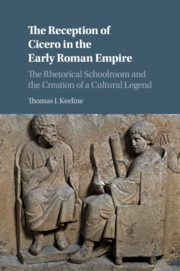 The Reception of Cicero in the Early Roman Empire
The Reception of Cicero in the Early Roman Empire Book contents
- The Reception of Cicero in the Early Roman Empire
- The Reception of Cicero in the Early Roman Empire
- Copyright page
- Dedication
- Contents
- Preface
- Note on Texts and Abbreviations
- Introduction
- Chapter 1 Pro Milone: Reading Cicero in the Schoolroom
- Chapter 2 Eloquence (Dis)embodied: The Textualization of Cicero
- Chapter 3 Remaking Cicero in the Schoolroom: Cicero’s Death
- Chapter 4 Pro Cicerone/In Ciceronem: How to Criticize Cicero
- Chapter 5 Seneca the Younger and Cicero
- Chapter 6 Tacitus: Dialogus de Cicerone?
- Chapter 7 Est … mihi cum Cicerone aemulatio: Pliny’s Cicero
- Epilogue: The Early Empire and Beyond
- Works Cited
- General Index
- Index Locorum
Chapter 6 - Tacitus: Dialogus de Cicerone?
Published online by Cambridge University Press: 06 July 2018
- The Reception of Cicero in the Early Roman Empire
- The Reception of Cicero in the Early Roman Empire
- Copyright page
- Dedication
- Contents
- Preface
- Note on Texts and Abbreviations
- Introduction
- Chapter 1 Pro Milone: Reading Cicero in the Schoolroom
- Chapter 2 Eloquence (Dis)embodied: The Textualization of Cicero
- Chapter 3 Remaking Cicero in the Schoolroom: Cicero’s Death
- Chapter 4 Pro Cicerone/In Ciceronem: How to Criticize Cicero
- Chapter 5 Seneca the Younger and Cicero
- Chapter 6 Tacitus: Dialogus de Cicerone?
- Chapter 7 Est … mihi cum Cicerone aemulatio: Pliny’s Cicero
- Epilogue: The Early Empire and Beyond
- Works Cited
- General Index
- Index Locorum
Summary
- Type
- Chapter
- Information
- The Reception of Cicero in the Early Roman EmpireThe Rhetorical Schoolroom and the Creation of a Cultural Legend, pp. 223 - 276Publisher: Cambridge University PressPrint publication year: 2018


